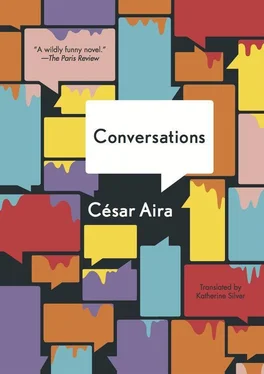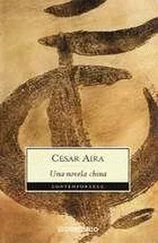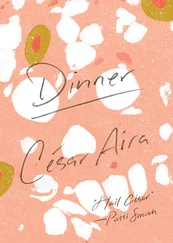César Aira - The Conversations
Здесь есть возможность читать онлайн «César Aira - The Conversations» весь текст электронной книги совершенно бесплатно (целиком полную версию без сокращений). В некоторых случаях можно слушать аудио, скачать через торрент в формате fb2 и присутствует краткое содержание. Год выпуска: 2014, Издательство: New Directions, Жанр: Современная проза, на английском языке. Описание произведения, (предисловие) а так же отзывы посетителей доступны на портале библиотеки ЛибКат.
- Название:The Conversations
- Автор:
- Издательство:New Directions
- Жанр:
- Год:2014
- ISBN:нет данных
- Рейтинг книги:4 / 5. Голосов: 1
-
Избранное:Добавить в избранное
- Отзывы:
-
Ваша оценка:
- 80
- 1
- 2
- 3
- 4
- 5
The Conversations: краткое содержание, описание и аннотация
Предлагаем к чтению аннотацию, описание, краткое содержание или предисловие (зависит от того, что написал сам автор книги «The Conversations»). Если вы не нашли необходимую информацию о книге — напишите в комментариях, мы постараемся отыскать её.
, a reality within a fiction within a parallel reality, is hilariously funny and surprisingly touching.
The Conversations — читать онлайн бесплатно полную книгу (весь текст) целиком
Ниже представлен текст книги, разбитый по страницам. Система сохранения места последней прочитанной страницы, позволяет с удобством читать онлайн бесплатно книгу «The Conversations», без необходимости каждый раз заново искать на чём Вы остановились. Поставьте закладку, и сможете в любой момент перейти на страницу, на которой закончили чтение.
Интервал:
Закладка:
In reality, I had never before dealt with the problem of having to choose between them. We never talked about movies or novels or any story that wasn’t related to our common cultural interests. This time I was delving into unchartered territory.
When I took the floor, after a brief pause, it was to tell him that even though I appreciated his fine labor of persuasion, I was still far from convinced, not out of obstinacy but because I realized that he had completely misunderstood the movie. Not that I had understood it much better, of that I was fully convinced; for example, I had thought that the two women played by the same actress were one, surely because I had missed the opening scenes and not paid enough attention when they had appeared together in the frame. My friend’s full recounting clarified this point, and, for my part, I also admitted that I had been distracted.
But even so, his error was the graver one because it had taken as the main plot of the movie what in reality was a side story, which was stretched out, it seemed, and woven into the main plot all the way through. I had focused on the main one to the extent that a mind trained in Philosophy could (or wished to) focus on an entertaining pastime that only marginally served as evening relaxation. However lightweight, the subject interested me, if only for the skill with which the melodramatic absurdity had been verisimilarized. In its formal aspect, I mean. But this had to in some way coincide with the content, and here would fit the statement, “There are no insignificant subjects.” These conspiracies for world domination said a lot about the spirit of the times and, even if they were fundamentally childish, they struck a chord in me.
The romantic storyline, though skillfully inserted, was secondary — and was perhaps insisted upon by the marketing gurus who advised the studio — to the dominant storyline of the “action and adventure thriller.” Both shared, however, the theme of the confrontation between civilization and those who are marginalized, or between the present and the past, or, if one wished to put it in more concrete turns, the suicidal cannibalism of power and the idyllic equilibrium of Nature.
With Señorita Wild Savage or without Señorita Wild Savage (because that part was accessorial), the goatherd was the visible and intelligible embodiment of innocent life that was nurtured by life itself and knew nothing of ambition or progress. But there were no more Edens in the world, and the stratagems of greed and domination reached even his remote corner. He was drawn into the conflict, and he rose to the circumstances; his relative advantage was that he was “playing a home game,” but the rules of “fair play” remained in effect, as they did in every movie made for a mass audience.
A CIA commando unit climbed the mountain to search for the famous toxic algae, whose importance for maintaining ecological balance and even for saving life on the planet had been shown to be essential. They were a large group, approximately twenty or thirty people, men and women, all carrying highly complex technical equipment. Leading the group was a veteran agent named Bradley. (The actor who played him, I told my friend in a parenthesis because I didn’t think he would have noticed, was the director of the movie. He nodded. He knew.) This man — a true gentleman — found the goatherd’s help to be highly fortuitous, for the search and communication equipment they brought with them was no match for his experience and knowledge of the mountainous terrain and its most deeply buried secrets. The two men, so different from one another, established a relationship of manly affection and trust that would be put to the test during the adventure.
The CIA had discovered that a group of Ukrainian terrorists were experimenting with the mutant algae for unknown reasons, and they sent their task force to gather research samples and evaluate the potential threat. It was an undercover operation, carried out with maximum secrecy, though it would not have been at all difficult to disguise it as a scientific expedition or even as a trip for adventure travelers. The reason for these precautions would slowly be revealed as the corresponding connections and ramifications came to light.
The goatherd was the first to have any inkling that something strange was going on: one afternoon, when he was gathering his goats to return to his hut, he found that one was missing. He looked for it hurriedly, for night was falling, conveniently slowly at those altitudes, but even so, his time was limited. He finally found it — dead. He was mystified because his animals were the epitome of health. But the plot thickened when he went to pick it up to take it with him, ostensibly to salvage its valuable wool, and maybe, if it hadn’t died from a contagious disease, to roast and eat it. He bent over, placed his hands under the dead body, tensed his muscles before lifting, and pulled. . His surprise was made manifest when he stumbled and fell backward. Instead of the hundred-odd pounds he had been expecting to lift, the dead goat weighed five or six, if not less. It seemed to weigh nothing, and when he budged it with so much excess effort, it shot into the air and fell on top of the goatherd, who had landed on his back. As it traced an arc through the air, it rippled in the wind, and suddenly it looked like a goat made out of a piece of fuzzy fabric, then suddenly like a shapeless piece of dough. When it landed (gently, like an autumn leaf) on the goatherd’s face and chest, it recovered its goatish shape. What had happened? The first explanation was that it was the hide emptied of contents, but when the goatherd, having recovered from his shock, looked more closely, he saw that this was not the case. It was whole. He folded it and placed it under his arm and carried it to his hut, where that night, by candlelight, he slit it open with a knife and saw that all its organs were in their proper places but the flesh had taken on the consistency of tissue paper.
Bradley took charge. All he needed was one look at those floppy remains to know what was going on. He did not immediately tell the goatherd, who found out by overhearing Bradley’s conversation with the group’s scientist. The goat had drunk “the dehydrating water,” which was the real threat that had propelled the North American spies to act.
They now had to precisely retrace the goat’s steps the night before in order to find where it had drunk. The goatherd was the only one who could possibly carry out such an undertaking, and they sent him off to bed right away so he would be well rested and ready to go at dawn. They spent the rest of the night preparing the equipment they would use in their search and to deal with the samples they would take. And something more. Now they had proof that the enemy had managed to synthesize the dehydrating water, and it was urgent that they neutralize this achievement, which would require the use of force.
These nocturnal preparations lasted a while, and one by one the members of the group went to bed to get some sleep. The camp they had set up consisted of several inflatable tents connected by tubular passageways, all lit by a dim, silvery light. An aerial shot made the compound look like a globular excrescence of the mountain under the starry sky.
Finally, Bradley and his scientific consultant, also an older man, remained alone in the command room. Bradley, his face showing obvious signs of exhaustion, took a bottle of whisky out of a trunk, opened it, and poured some into a couple of glasses. In the intimacy thereby created and portrayed, the tone of their conversation became less practical. The alcohol relaxed them; and well it might, for that first whisky was followed by a second, then a third. They discussed the profession they had both chosen and practiced their entire lives, the profession that had brought them to this remote corner of the planet, just as it had brought them to so many others before. But, they wondered, had they chosen it? The scientific consultant said that science had been his true vocation, and that if he had ended up as a spy, it was due to circumstances; among those circumstances he included the budgetary cuts to laboratories and research centers, the vertiginous rise in the salaries at government agencies, the responsibility a citizen felt when faced with threats to the free world, and, in order not to externalize all the causes, a lack of creative talent to pursue his vocation. Bradley agreed: his case offered an almost perfect parallel. His original vocation had been art, and he had also been unable to stick to it with the required heroism. But he consoled himself with the thought that he had not done so badly after all. And, the alcohol having already loosened his tongue, he developed a theory about espionage as an art and a science. According to him, it was a qualitative activity. It didn’t matter if a lot or a little was achieved, that is, if a lot or a little information was collected — what mattered was its quality; it could be minimal — a word, a letter, a number — but it had to be good. Like expert appraisers, they wandered the globe in search of this precious element, their eyes growing sharper and sharper with the years. They were not searching for a vein of gold, except as a metaphor. The difference was that they were searching for something that resided in a mind, even if it was also recorded on a piece of paper or as an object. And as that mind participated in other minds, and these in still others, the search expanded. .
Читать дальшеИнтервал:
Закладка:
Похожие книги на «The Conversations»
Представляем Вашему вниманию похожие книги на «The Conversations» списком для выбора. Мы отобрали схожую по названию и смыслу литературу в надежде предоставить читателям больше вариантов отыскать новые, интересные, ещё непрочитанные произведения.
Обсуждение, отзывы о книге «The Conversations» и просто собственные мнения читателей. Оставьте ваши комментарии, напишите, что Вы думаете о произведении, его смысле или главных героях. Укажите что конкретно понравилось, а что нет, и почему Вы так считаете.












